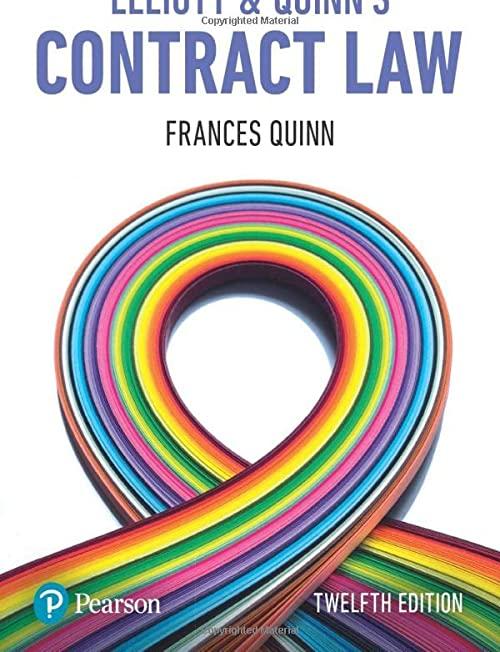Question
11. This characteristic of a contract states Obligation arising from contracts have the force of law between the contracting parties and should be complied with
11. This characteristic of a contract states "Obligation arising from contracts have the force of law between the contracting parties and should be complied with in good faith.
a. Relativity
b. Obligatory
c. Mutuality
d. Autonomy
12. A sold his land to B. Although the sale was made orally, B still paid A the agreed price. Later, B wanted to have the sale registered but he needed a public instrument. What can B do?
a. B may compel A to execute the public instrument because the contract is valid.
b. B cannot compel A to return the price because the contract is not enforceable.
c. B may only sue A to return the price because no one may enrich himself at the expense of another.
d. B may occupy and use A's land as a buyer in good faith.
13. If mistake, fraud, inequitable conduct, or accident has prevented a meeting of the minds of the parties to contract, the proper remedy is:
a. Sue for specific performance of the contract.
b. Ratify the contract.
c. Annulment of the contract.
d. Reformation of the contract.
14. D is indebted to C for P10,000. For the purpose of defrauding C, D sold his only parcel of land to X valued P10,000. X has no knowledge of the intention of D.
a. The contract D and X is binding.
b. The contract is voidable because S is in bad faith.
c. The right of C is to rescind the contract because the transaction is fraudulent.
d. The contract between D and X is rescissible.
15. L entered into a contract of lease with X. T, the clerk of L, typed the document. Due to T's negligence, the document made was that of sales instead of lease.
a. The remedy is annulment.
b. Parties may go to court for interpretation.
c. Parties may enforce their right because it is enforceable.
d. None of the above.
16. S owns an oil painting. Being in need of money, S sold the painting for B for P1,000. After the sale S discovered that the painting was valuable and worth P5,000.
a. S may rescind the contract on the ground of lesion or inadequacy of cause.
b. S may annul the contract on the ground of fraud.
c. S may annul the contract on the ground of error.
d. B is entitled to the benefit of the contract because it is valid and binding.
17. G was appointed guardian of S, the latter being 16 years old. S sold his parcel of land in writing to B valued at P100,000 for P75,000 suffering lesion by 1/4 of the value. What is the status of the contract?
a. Rescissible
b. Unenforceable
c. Enforceable
d. Voidable
18. D owes C P10,000. But the debt soon prescribed. Later X, against the consent of D, pays C P10,000.
a. X cannot recover from D what he pays C
b. X can recover to D P10,000 because the latter was enriched at the expense of X
c. C is liable to X for P10,000
d. X has no right
19. D owes C P500. However, C's right has already prescribed. Notwithstanding the knowledge of this fact, D paid the amount. Realizing this mistake, D wants to recover the amount he paid.
a. D can be made to recover on the ground of mistake
b. D can be made to recover on the ground that his obligation is not legally enforceable
c. D can be made to recover because this will enrich C at the expense of D
d. D cannot recover
20. On July 15, 1991, X entered into a contract with Y. On February 10, 1992, X discovered that fraud was committed at the time he entered into the contract, a fraud that vitiated his consent. The action for annulment shall be brought.
a. Within three years from the time of fraud
b. Within four years from February 10, 1992
c. D can be made to recover because this will enrich C at the expense of D
d. On February 10, 1992
Step by Step Solution
There are 3 Steps involved in it
Step: 1

Get Instant Access to Expert-Tailored Solutions
See step-by-step solutions with expert insights and AI powered tools for academic success
Step: 2

Step: 3

Ace Your Homework with AI
Get the answers you need in no time with our AI-driven, step-by-step assistance
Get Started


